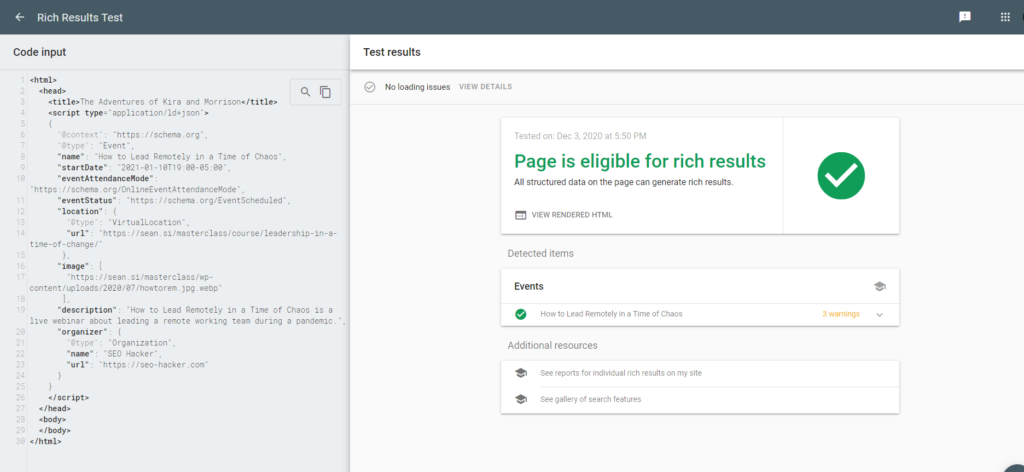Event Schema Markup and Rich Results Guide
What is an event schema markup?
Quick Answer: Schema is a type of code that help search engines (like Google) better understand the content on a given page. This is used to present more informative and “rich” results for users. So using event schema markups will help Google know you’re hosting and promoting events. This can really help optimize your pages, so they’re more likely to pop up on the SERPS.
Overview
Does your business or organization host events? Do you use your website to promote it? Do you want more attendees? If your answer to these questions is yes, the Event Schema Markup could help you out with that.
Structured data may not be a direct ranking factor but it does help search engines better understand the context of websites. It is especially helpful in Google. By properly marking up your Events pages with Event Schema, you’re helping Google understand your pages better and in return get more traffic through Rich Results.
Event schema is one of the supported structured data types by Google for Rich results which makes your website more visually appealing in the search results, increase your organic presence, and ultimately, attract more clicks.
What is Event Schema?
The Event schema is a type of structured data markup that informs search engines that a certain webpage is about an event that is happening whether offline or online, such as concerts, seminars/webinars, gatherings, and more.
How to be Eligible for Event Rich Results
To be eligible to appear for Google’s Event rich results, you have two options:
Add your event to a third-party website that implements Event schema markups
This is the easiest option out of the two. There are a lot of events aggregator websites where you could simply create an account and post your event details. If the website automatically implements Event schema across their pages then your event may be eligible for rich results. However, there are disadvantages such as you won’t be able to manually implement edits to the schema markup, monitor its performance in Google Search Console, and traffic won’t be going directly to your website.
Implement Event schema markup using a plugin in your CMS or by manually implementing it through HTML
Most content management systems like WordPress have plugins that could help you with implementing structured data markups across your website. You just have to fill in the details and identify which pages the markup is going to be implemented.
But if you prefer doing it manually or your CMS doesn’t have plugins to automate the process, you could write the JSON-LD code and manually implement it through HTML. There are a lot of formats out there that you could simply copy, paste, then edit. I’ll be giving examples below.
Event Schema Properties
For the full details on each property, read Google’s full documentation for Event Schema.
Required
- Location
- Name
- Startdate
Optional
- Description
- Enddate
- Eventattendancemode
- Eventstatus
- Image
- Offers
- Offersavailability
- Offers.price
- Offers.pricecurrency
- Offers.validfrom
- Offers.url
- Organizer
- Organizer.name
- Organizer.url
- Performer
- Performer.name
- Previousstartdate
Specific Event Types
- BusinessEvent
- ChildrensEvent
- ComedyEvent
- CourseInstance
- DanceEvent
- DeliveryEvent
- EducationEvent
- EventSeries
- ExhibitionEvent
- Festival
- FoodEvent
- Hackathon
- LiteraryEvent
- MusicEvent
- PublicationEvent
- SaleEvent
- ScreeningEvent
- SocialEvent
- SportsEvent
- TheaterEvent
- VisualArtsEvent
Sample Event Structured Data Markup
Here is a sample structured data markup that you could copy and paste then fill up with the details of your event and simply implement them to your webpages. This includes the required properties and some of the optional properties like description and image. While this is already acceptable, it is still best to provide as much information as possible.
<script type=”application/ld+json”>
{
“@context”: “https://schema.org”,
“@type”: “Event”,
“name”: “How to Lead Remotely in a Time of Chaos”,
“startDate”: “2021-01-10T19:00-05:00”,
“eventAttendanceMode”: “https://schema.org/OnlineEventAttendanceMode”,
“eventStatus”: “https://schema.org/EventScheduled”,
“location”: {
“@type”: “VirtualLocation”,
“url”: “https://sean.si/masterclass/course/leadership-in-a-time-of-change/”
},
“image”: [
“https://sean.si/masterclass/wp-content/uploads/2020/07/howtorem.jpg.webp”
],
“description”: “How to Lead Remotely in a Time of Chaos is a live webinar about leading a remote working team during a pandemic.”,
“organizer”: {
“@type”: “Organization”,
“name”: “SEO Hacker”,
“url”: “https://seo-hacker.com”
}
}
</script>
This works best for manual applications but if you’re using WordPress, I wrote an article about the best plugins that you could use to help you implement structured data markups across your website.
Testing your Event Schema Markup

To check if the Event schema you’ve implemented or written has errors, use Google’s Rich Results Test. There are two methods to verify your markup: via URL or code.
You could use the URL method to check if the schema markup that you have already implemented on a webpage is correct. But if you want to check if your schema markup is right before you implement it, you can use the code option.
Both methods will provide you with the same results, the Rich Results Test will automatically detect the type of structured data markup you’ve implemented and will tell you if it is eligible to appear in rich results. It will also inform you of any errors in your code.
The Rich Results Test may also show ‘Warnings’ but these are just Event schema properties that are optional and you should not be alarmed by them.

Key Takeaway
The Events Industry has changed a lot; from the time when people had to read posters about an event they’re interested in, to today where all information needed is found online. Making sure that your events are getting the maximum visibility online is a must. People who can easily access details that they need to know about your event keeps them engaged and interested. Make sure to utilize all the tools that are available, especially Google’s rich results. It’s easy, free, and will provide you lots of success with your events.
